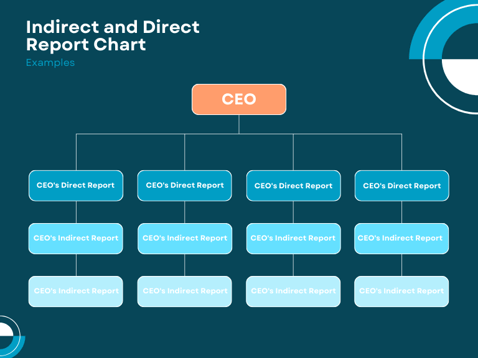
Written by
Katie Shpak
Katie is the leader of the marketing team at BerniePortal. She oversees all content creation.
What Are Direct Reports?

What Is a Direct Report?
A direct report is an employee who works directly below a leader within the company who is above them in the organizational hierarchy. Direct reports are given goals, assignments, and responsibilities from that leader. It’s common for supervisors within an organization to have multiple direct reports.
Who Has Direct Reports?
Anyone in a leadership or supervisory position typically has direct reports. While the CEO is often seen as the top of the hierarchy, even they may report to a board of directors or investors.
Some positions that commonly have direct reports include:
-
Team leaders
-
Department heads
-
Managers and supervisors
-
Directors and vice presidents
-
The company president and CEO
It's important to note that being a direct report doesn’t mean someone holds a low-ranking position—it simply refers to their reporting relationship within the organization.
Direct Reports vs. Indirect Reports: What's the Difference?
While a direct report reports to a specific manager, indirect reports are employees who report to that same manager’s team or department—but not to the manager directly.
To clarify:
-
A direct report receives tasks, coaching, and performance feedback from a specific leader.
-
An indirect report may be further down the chain of command and is typically supervised by one of that leader’s direct reports.
Here’s an example: A CEO’s direct reports might include the CFO, CMO, and COO. But a marketing specialist who reports to the CMO would be an indirect report to the CEO.

Why Are Direct Reports Important?
The purpose of a direct reports system is to create an effective process delegating tasks, monitoring performance, and reaching goals. Let’s discuss each of these benefits a little more in depth.
Task Delegation: It can be difficult for some leaders to properly delegate tasks. Without direct reports, managers or supervisors may be acquiring far too much work to handle alone. Direct reports can take on some of the department’s responsibilities and give the leader more time to focus on larger organizational goals.
Monitoring Performance: When tasks are delegated to direct reports, it becomes far easier to monitor how each employee is doing on each task, whereas if a direct report system were not in place, there wouldn’t be consistent feedback check-ins to monitor the results and make improvements as needed.
To best monitor performance, leaders should have regular 1:1 meetings with their direct reports. These meetings provide an effective feedback process and a consistent platform for direct reports to communicate with their supervisor. To easily track a direct report’s progress over long periods of time, these meeting recaps can be documented and stored in a performance management feature.
Reaching Goals: A direct report system creates more organization among talent within the company and it provides clear structure to each department. Structure and organization reduce unnecessary hindrances, which lead to more efficiency. More efficiency makes it easier for a company to hit its goals.
Additional Resources
You can stay informed, educated, and up to date with important HR topics using BerniePortal’s comprehensive resources:
- BernieU—free online HR courses, approved for SHRM and HRCI recertification credit
- BerniePortal Blog—a one-stop shop for HR industry news
- HR Glossary—featuring the most common HR terms, acronyms, and compliance
- Resource Library—essential guides covering a comprehensive list of HR topics
- HR Party of One—our popular YouTube series and podcast, covering emerging HR trends and enduring HR topics

Written by
Katie Shpak
Katie is the leader of the marketing team at BerniePortal. She oversees all content creation.
Related Posts
Ghosting—when communication abruptly ceases without explanation—has become a common issue...
Navigating the complexities of hiring can be challenging, especially when it comes to...
Thomas J. Peters, best known for his book In Search of Excellence, once stated, “The day...
First impressions work both ways. An employer’s impression on a candidate during an...



.jpg)




Submit a Comment